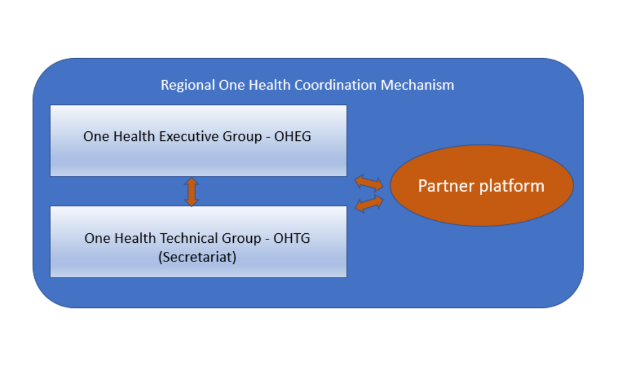The second online meeting of the Regional One Health Coordination Mechanism – Partner Platform Europe and Central Asia was held on 24 March 2025 at 13:00 CET, building upon the discussions initiated during the in-person meeting in Vienna (June 2024). The meeting gathered representatives from the Quadripartite (QPT) organizations—FAO, WHO, WOAH, and UNEP—and regional and national partners to coordinate and align support for the One Health implementation in Azerbaijan, Kyrgyzstan, and Montenegro.
The Regional One Health Coordination Mechanism (ROHCM) of the QPT organisations was established in 2022 to enhance strategic leadership, foster stakeholder collaboration, and support Member States in operationalizing the One Health approach across Europe and Central Asia. Following the publication of the One Health Joint Plan of Action (OH JPA) and its Implementation Guide, the Partner Platform was developed as an integral part of ROHCM to promote regular dialogue among partners and avoid duplication of efforts in addressing risks at the human-animal-environment interface.
The meeting aimed to:
Present the current One Health scenarios and priorities of Azerbaijan, Kyrgyzstan, and Montenegro.
Share planned activities by the QPT and partners for 2025–2026 in those countries.
Identify gaps between existing plans and national needs, and discuss collaborative strategies to enhance impact.
Introduced by Simona Seravesi (WHO), Azerbaijan’s presentation outlined the results of various situation analyses and national strategies. A mapping exercise demonstrated how the planned activities by QPT and partners align with the country’s priorities. In addition, the ongoing activities and frameworks planned by the government of Azerbaijan targeting the One Health approach implementation, were also mentioned.
Pablo Sagredo Martin (UNEP) and Maria Grazia Dente (ISS), in their slides, introduced Montenegro’s One Health priorities and the outcomes of the MediLabSecure Situation Analysis (2023), followed by a second mapping exercise that identified current efforts and existing gaps. Key developments include the development of an AMR One Health Roadmap supported by ECDC, a proposal to include Montenegro’s universities in the Una Europa academic network (Bruno Gonzales-Zorn), the WOAH Regional Seminar on Vector-borne Diseases promoting multisectoral strategies, and QPT’s support for formalizing a National One Health Coordination Mechanism.
Maripa Kichinebatyrova (FAO) introduced activities funded by the Pandemic Fund, focusing on surveillance systems, laboratory capacity, AMR monitoring, risk communication, and community engagement, as outlined in her supporting materials. A third mapping exercise assessed how these activities align with the country’s needs. Additional initiatives include the Nature Conservation and One Health Project (IUCN–CMS) aimed at strengthening resilience in Central Asia, and community-based surveillance implemented by the Red Crescent Societies to support early detection of zoonotic diseases.
Charlotte Schrurs (World Bank) presented the “One Health for Pandemic Prevention, Food Systems Resilience and Ecosystem Health in Central Asia” regional program (2025–2032). The initiative seeks to strengthen disease detection, AMR response, and food safety systems in Kazakhstan, Kyrgyz Republic, Tajikistan, Turkmenistan, and Uzbekistan. As a complementary contribution, Ludovico Sepe from the German Federal Institute for Risk Assessment (BfR) and the European One Health Association (EOHA) shared the presentation “AI-powered risk negotiation mechanism to support the interaction among sectors for the assessment of a health crisis”. Developed by the MicRisk consortium, this tool aims to foster stakeholder collaboration by integrating the concept of “risk negotiation” into risk analyses, thereby enabling a more holistic and balanced assessment of health threats and supporting the negotiation of more inclusive solutions among sectors.
This online meeting of the Partner Platform for Europe and Central Asia represented a pivotal moment in advancing the collaborative framework outlined during the in-person session held in Vienna in June 2024. By initiating the biannual coordination cycle, the meeting operationalized one of the key outcomes of the Vienna discussion and set a precedent for sustained, structured engagement among partners. It reaffirmed the Platform’s evolving role as a dynamic, inclusive space for strategic coordination, mutual learning, and transparent exchange of priorities, challenges, and technical expertise. Through joint mapping exercises, focused presentations, and country-specific dialogues, the session fostered a shared understanding of national One Health priorities and enabled partners to better align their efforts. This collective momentum not only strengthens synergies among the Quadripartite and supporting stakeholders but also enhances the capacity of Azerbaijan, Kyrgyzstan, and Montenegro to develop and implement integrated, context-specific responses to complex health risks at the human-animal-environment interface. Looking ahead, this online meeting lays the groundwork for more agile, informed, and collaborative action across the region.
